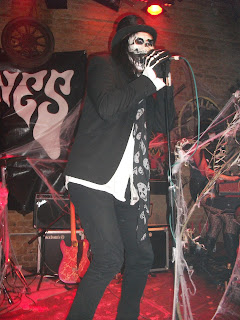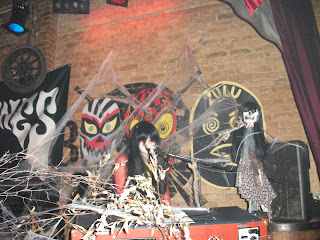http://kitchenlegrecordsberlin.bandcamp.com/album/ruins-of-kr-ger-s-t
RUINS OF KRÜGER
RUINS OF KRÜGER
The
be-all and end-all for joining a band – interview with Andrew and Jan
Setting:
3.5.2014 tape release of “Ruins of Krüger s/t” at Occulto Fest (topic:
indeterminacy) 2014 in Berlin. Record label: Kitchen Leg Records
Please introduce yourselves, the band, and tell me about
your connection to the Occulto Fest.
Andrew:
I play bass in Ruins of Krüger and I am also one half of Kitchen Leg Records
which is our connection to the Occulto Fest. Tonight, we are releasing our
first cassette of Ruins of Krüger. The co curator, the artist and scientist
DuChamp, of this festival is the other half of the label.
Jan:
I play guitar in Ruins of Krüger.
Andrew:
We are 5 people in the band: two guitars, bass, drums, and singing. We have
been playing together for almost 3 years now. We all know each other in various
formations. So, there is a history of longstanding friendships and
relationships.
Jan:
That is very true. For instance I have known Georg, the other guitarist for 15
years which is a really long time. We have always made music together and are
very experienced at playing together.
Andrew:
Basically, this idea of friendship that pins down the band is very important to
Ruins of Krüger since it keeps things together. Also, the type of expression we
have is reflected in the comments we usually get from people. Ruins of Krüger
has a solid identity which means that the whole is greater to them than the
individual parts; it is an expression of music that is created by a real group
where everybody has almost equal input.
Jan:
The songs are made in the rehearsal room with input from everybody. So, there
is no one person, like maybe a song writer, who dominates the band. You can
also tell from how the songs come into existence: some of them are improvised;
some of them are composed. Either way
the whole group process is very important to us.
What is the Occulto Fest for you personally about?
Andrew:
Well, evidently, this is our opportunity to present our new tape. I do not know
whether there is an occult aspect in our band, but on a psychic level, I am
sure, yes.
Jan:
I got to know the Occulto Magazine like three weeks ago and have not finished
reading my two issues yet; it is quite new to me. The Occulto Magazine is based
on a great concept. I do not know too much about the Occulto Fest yet. Today
it’s the first time that I am visiting the festival.
Andrew:
I was a DJ at the last festival, but only last year. So, my history with the
fest is a bit longer. This is the fourth time they have done it.
Where do you draw your inspiration from and what is your
background in arts and music?
Jan:
I am an artist actually. I studied art in Karlsruhe. I have been making art and
music all my life. Art and music go together and, for me, are one thing.
Andrew:
In Ruins of Krüger the band members are sound producers, trained artist,
graphic designers. So, there is a lot of Vielfältigkeit in our approach to
music. Actually, we do not want to sound any particular way; it is just what
comes out when play together. Like, we do not sit around questioning who we
sound like or anything. We do not even talk too much about things outside like
what we are listening to. Band names come up in conversations infrequently...if
at all then maybe artists like Devo and This Heat.
Jan:
Oh, I remember somebody mentioned Tactics. There are things that we all like,
but I can´t really speak for the whole group. Some of us have a punk and indie
background, but not everybody. Most of us really just like interesting music.
Andrew:
Sure, there are overlaps. Most of us prefer music that is done in a
particularly creative way…songs that not sound straight. If you produce pop
music in a slightly lopsided way it can really change and become much more
interesting.
How would you encourage young people who want to play in
a band?
Jan:
Just go ahead and do it; just get some instruments…
Andrew:
I gave a piece of advice to a friend the other day as it is sometimes really
difficult to communicate with the other people when you are trying to join a
band. It can be very sensitive situation, often, when you have a group of
people. For example, if one person has this vision and specific expectations as
of what should happen. And also, people can be very sensitive regarding their
art no matter what they are doing.
Jan:
It is kind of a training situation for communication to be in a band.
Andrew:
Very true, you have to really try to understand the other band members and not
rush the judgment too quickly and sort of realize that it can be complex.
Basically, you have to be sensitive to other members´ sensitivities. Sometimes,
we hear from friends as we all hang out together, it can be a very difficult
process. Especially since outside the musical context they may not always get
along well.
Jan:
We are even living in buildings that are attached to one another.
Andrew:
To us, and I am speaking on behalf of all band members, it means a lot to be
able to play in this band. I am super grateful just for the opportunity to play
with Ruins of Krüger. For years, before I met the band members, I felt like I
can´t really find the right people. If you are trying to join a band it can be
very difficult as people may have different expectations or a certain idea of
professionalism. Commercial aspirations and stuff like this…. I always felt
like this was challenging because of the stuff that I wanted to do and because
of what I am interested in. So, playing in this band is very rewarding as this
is what I wanted to do all along.
Jan:
Try to find people you really like and who you can communicate with. Go on an
exploration trip with them together and figure out what you want to do together
as musicians. Unfortunately, we do not have any advice on how to be successful.
It is just fun and great to play and experiment with music together
Andrew:
Your band should feel true to what you want to do really. To be able to do this
with other people is very rewarding… especially when I hear from others how
difficult it can be (or if I think of my own difficulties) to form a band. The
idea of egos getting in the way seems to be a frequent thing. Just try the best
you can to go in a direction where that goes pushed out a little bit…and see
what happens in the group. It is a little bit like trying to dissolve the ego a
little bit for a little while.
So, you are basically saying it is essential to have
harmonious relationships with all band members, but it can be fairly
challenging as everybody is an individual at the end of the day?
Andrew
and Jan: Yes, yeah. Exactly!
Jan:
You do not want to lose your identity; that is what I meant by “training
situation for communication”. You will always want to contribute with your
identity to the group.
Andrew:
Some people get together and they might have some excitement and some idea …and
that happens really quickly. Then there
is some disillusionment and it is over before it starts.
We
chose a different strategy. Ruins of Krüger had been practicing for a whole
year before we made our first actual show. It did not feel rushed and no one
had an idea of when it was going to happen.
We just practiced once or twice a week and a whole year went by…which
seems still quickly now in retrospect.
Jan:
We had an instrumental gig early on as a test, but our singer joined us some 5
months after we had started.
Andrew:
The way we composed and played songs, especially at the beginning…most of them
were not easy to memorize. We made so many changes to them and sometimes we
would get mixed up about which songs had which changes. And of course, in the
meantime, we learned to play in this formation.
What
is your next step?
Andrew:
Nothing in particular and I do not know whether we have a gig lined up. It is
always good to have something on the horizon to work towards. Sometimes you
have off-periods, like when a band member goes on vacation, but common goals
are important as they bring people back together to steady practice.
Jan:
I want to make a video before we play our next gig. I just have not picked a song yet.
Me:
Okay, thank you very much for giving this interview. I wish you great night at
OCCULTO FEST and much success for your upcoming gig.
Jan
and Andrew: You are welcome. Thank you very much. Have fun at the fest.
Interview:
Annabell Weimar























